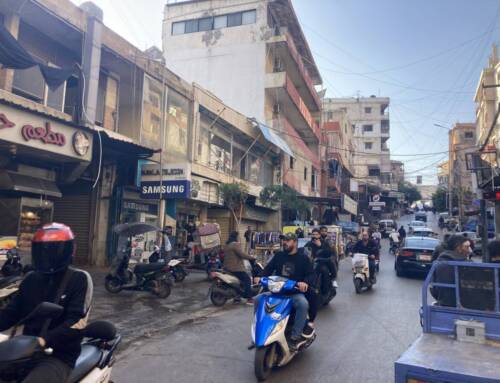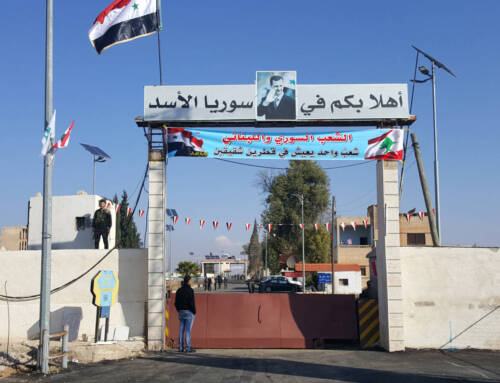Financial hurdles and language barriers await ‘uprooted’ Syrians seeking education in the US, says education advocate
An estimated 100,000 Syrian refugees are university-qualified students, the New […]
20 March 2018
An estimated 100,000 Syrian refugees are university-qualified students, the New York-based Institute of International Education reported in 2017.
Many refugees, uprooted from their local communities, saw their education come to a grinding halt when they fled Syria. For those residing in the United States, the language barrier and financial costs of pursuing a higher degree can be prohibitive, says Shiyam Galyon, Managing Director of the New York-based advocacy group Books not Bombs.
Galyon’s organization appeals to universities to create scholarships and opportunities for displaced Syrians who wish to pursue higher education in the US. To date, Books not Bombs has helped create more than 1.9 million dollars worth of scholarships in the US, Canada and beyond, Galyon tells Syria Direct’s Justin Clark.
“Everyone has a right to an education,” she says.
Q: What is the mission of Books not Bombs?
Our mission is to serve displaced Syrian students. We campaign at higher educational institutions to create opportunities. To date, we have helped create $1.9 million worth of scholarship opportunities open to Syrian students.
Each scholarship opportunity looks different depending on the institution. Higher education is not homogenous—it’s really a jungle out there. We don’t accept applications or decide who gets them.
We’re trying to increase the possibility for a Syrian student who has had their education disrupted to complete their higher education and pursue the profession that they want.
We fundamentally believe that everyone has a right to an education.
Q: What do you see as some of the most significant challenges that a Syrian integrating into the American education system might face?
The first major challenge is navigating the financial cost. The cost of higher education in the US is ridiculous.
Another challenge is just preparing the application. It’s not impossible, but it’s difficult. [Syrian students] might not have their papers. They might not have been been able to find work for the past few years and, as a result, their CV isn’t outstanding.
[Ed.: As many as 70 percent of Syrian refugees worldwide lack a national ID card, the Norwegian Refugee Council reported in 2016, while others are unable to document their professional and academic histories.]We tell universities: ‘Look at these amazing students with outstanding field experience.’ But the issue here is the right to an education, and that education was interrupted by conflict.

Studying for the TOEFL is a challenge [Ed.: an English proficiency exam taken by international students in the US.]. There are definitely Syrian students who are good at English, but it was not emphasized in the Baathist curriculum. There are students with what I call outstanding experiences that could contribute a lot to their field [but are excluded due to language issues.]
I met one woman a few days ago who was a revolutionary and feminist activist in Aleppo and did things like protest in front of ISIS headquarters in the city. Today, she wants to study political science. Her English is not 100 percent—she’s still working on it. However, I think she would be an extremely valuable addition to any classroom on counter-terrorism or [security] policy.
The last one is getting the proper mental health support. Some people can be triggered by the news cycle during school. I have also heard [Syrian students] talk about being behind in life. When you’re displaced or uprooted, you feel like you’re not where you’re supposed to be—you’re not where you want to be or where you imagined life for yourself to be at this age. I think that puts a lot of pressure on people.
Q: Could you talk how the differences between the Syrian and American educational systems impact students trying to transition into US universities?
Education can be used to both liberate and control.
In the Syrian Baathist regime curriculum, school was a means of social control—rote memorization and a lot of government propaganda. It was also a place where teachers could police students in terms of what they could or couldn’t say.
There’s definitely a lot to say about American education and how it’s used to control people domestically. But when Syrian students come to the American education system, it is a less rigid space for the most part.
It is not easy being a student in America, but the state doesn’t use the classroom as a means of control in the same way that the Syrian regime does. When I hear Syrian students talk about their experiences, they really love it for the most part. They love engaging in conversations and being able to learn things they’re really interested in.
Q: What keeps you personally motivated to continue your work with Syrian refugees and education?
I’m part of the generation that grew up during America’s War on Terror. As an Arab, a Muslim, I dealt with Islamophobia and anti-Arab racism and pushed back against it.
I learned as an American about social justice and our own history of social struggle. Then, the Arab Spring started. I felt a sense of purpose: [bridging] the conversation in my country, America, and the conversation in Syria, as I’m also a Syrian citizen.
I wanted to work on campaigning since it’s bringing about change. You’re taking all of the things that journalists and think tanks are producing—the research and the numbers—and doing something with it. Campaigning also allows me to meet people, build relationships, interact with them and produce something new.








